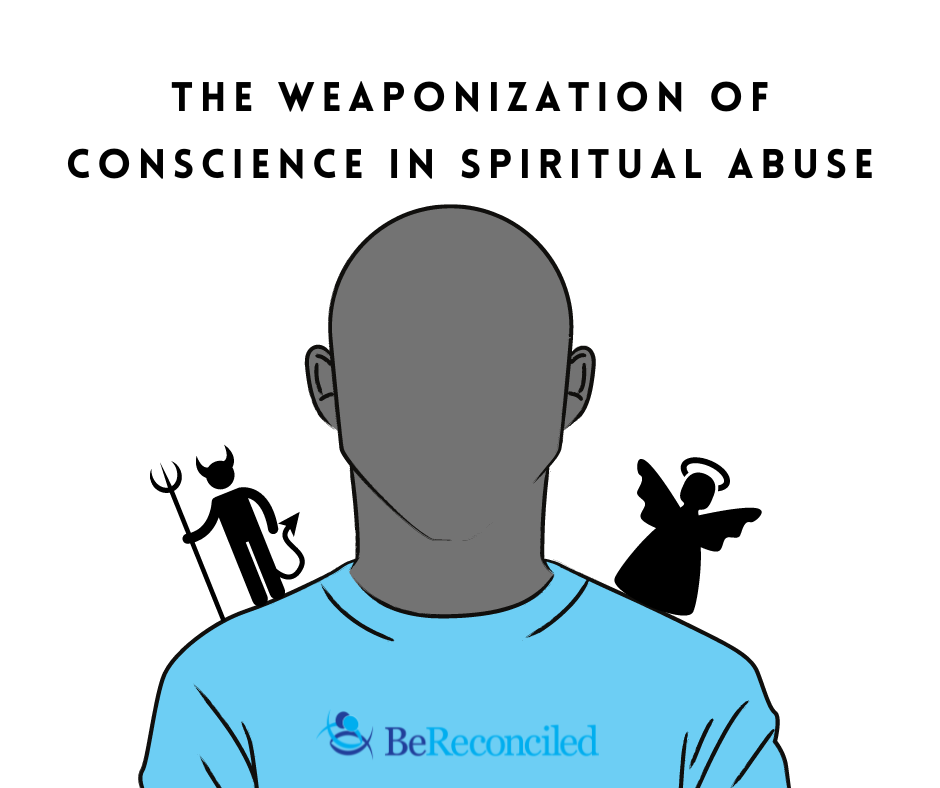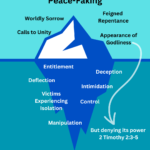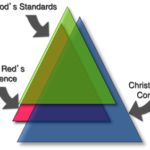In this post, we will look at the role of conscience in spiritual abuse. We will look at how oppressors inappropriately bind the conscience of others to their own advantage and see how a properly calibrated conscience resists spiritual abuse. Abuse reveals a profound lack of love. Dealing with abuse is a test of an organization’s love of righteousness. In an abusive relational system, power is exercised in a harmful way creating a privileged status for the abuser. You’ll see the oppressor exercise coercive control in ways he would not tolerate from his victim if their roles were reversed. An abusive relational system is complete when a victim complies with an abuser’s entitlement, control, and coercion to their own harm. This compliance may be due to force, fear, or even religious beliefs.
How can religion be twisted and used to control others? Abusers may play on the guilt of a victim’s sensitive conscience. Last year, I wrote about Misplaced Assignment of Responsibility in Abuse, talking about the insidious aspect of abuse where oppressors place misplaced responsibility and guilt on the oppressed. The oppressor engages in deflection, where the oppressor diverts negative attention away from himself and seeks positive attention for himself. This can be very damaging psychologically, emotionally, physically, and spiritually. If a victim’s conscience is manipulated to fit the mold of an oppressor’s privileged status, the victim will self-police himself into compliance with the oppressor, believing that he or she is actually doing the right thing in enduring injustice.
A person’s conscience is his current understanding of what he believes to be right and wrong. Our conscience is a gift from God to us. We should not ignore our conscience. It warns us to flee the dangers of sin to find safety. When our conscience rightly accuses us, we should turn to Christ for forgiveness and cleansing. While we should never act against our conscience, we should also remember that our conscience is not infallible and may not be properly calibrated. In situations of spiritual abuse, oppressors with seared consciences will bind the consciences of victims in ways that promote the oppressor’s entitlement. This is the opposite of true gospel freedom and love. Submission to an oppressor gets valued over submission to Christ. Yet true liberty and safety comes from submission to the Lordship of Jesus Christ. He is the only rightful Lord of the conscience.
In the following examples, see if you can spot how an abuser manipulates others and works to miscalibrate and bind a victim’s own conscience against them to control them:
- A church leader hiding his sexual exploitation may accuse a teenage girl of dressing immodestly as the reason for his lack of self-control, placing the responsibility and burden of his sin on her. She thinks, “Oh no, I caused a godly man to stumble.” The leader tells the victim to stay quiet about her abuse so that his wife and children do not suffer grief and so that “God’s work” can continue on. The victim does not want to hinder God’s work from continuing on, feels guilty for causing a “godly man” to stumble, and remains silent.
- An abusive husband accuses his wife of adultery and not being faithful to him without any basis in reality. He calls her the B-word and uses anger to control her. In reality, he is the one with a porn and faithfulness problem. He demands that her movements be tracked at all times through her phone and he controls the friends she spends time with. The wife begins to believe that she hasn’t been faithful and believes that she is a bad wife. She desires to be a good and godly wife, seeking to please her husband but always falling short of his standards. She finds herself living in increasing fear and isolation.
- An elder tells a congregant that it was a violation of the 9th commandment for him to record the lead pastor’s fauxpology to the congregation, in which he apologized for not being controlling enough, staged after the lead pastor lost control of his anger at a business meeting involving significant raises to his own salary. In a show of hypocrisy and entitlement, leadership records a business meeting after telling others it is a sin to record them. The congregant is told he is a deceiver and slanderer for calling out the lead pastor’s public anger, false repentance, and spiritual abuse. The lead pastor actually violates the 9th commandment by making up lies to discredit the truth teller, engaging in actual slander. Should the congregant feel guilty for violating God’s law and not submitting to his elders? (Matthew 15:9.)
In these examples, we see that an oppressor attempts to bind the conscience of his victims to control them to his benefit. He may attempt to redefine what sin is by twisting God’s word or redefining history (gaslighting). The binding of consciences by oppressors is a tool of both deflection and manipulation. The oppressor deflects responsibility that belongs to him and shifts the blame to the wrong party. Victims often believe their oppressor’s narrative that they are the problem. When an oppressor has a victim believing they are in the wrong, it is easier to extract compliance. Where there is compliance, the oppressor’s corrupt behavior and entitlement are more easily hidden. Victims in the fog of oppression may even defend their oppressor, thinking they rightly deserve their unjust treatment as punishment for their own sins.
As ambassadors of Christ, when we deal with the oppressed who carry misplaced guilt and misplaced assignment of responsibility, we want them to see their oppression for what it is and understand their worth and value in Christ. An oppressor wants his victims to play the role of savior to the abuser. While an oppressor wants others to atone for his sins and lay down their lives for him, Christ did the opposite. He came to lay down his life for his sheep. Christ came to give us life, and that more abundantly.
In helping the oppressed to find freedom, we must point them to the Lord Jesus Christ, where there is true pardon from any transgressions of His law and true freedom and safety. Abusers imitate Satan our accuser, when “he slanders Christ to us” and “slanders us to ourselves.”[1] Advocates on the other hand want the oppressed to know what is true about themselves and also what is true about God.[2] To modify an old hymn, “when Satan, an oppressor (my words) tempts me to despair, and tells me of the guilt within, upward I look and see him there, who made an end to all my sin.”
Jesus came to proclaim liberty to the captives and recovering of sight to the blind, to set at liberty those who are oppressed (Luke 4:18). As his ambassadors, we are called to proclaim true freedom, found in the gospel. The good news that Jesus died for sinners and freedom are tied together. “It was for freedom that Christ set you free. Therefore do not be subject again to a yoke of slavery.” (Galatians 5:1)
A Clean Conscience Through Christ
When we experience godly guilt from an unclean conscience, we can find cleansing for a clean conscience through faith and repentance in Christ. Godly guilt sees sin foremost as against God and leads us to repentance and salvation. This is contrasted with worldly sorrow which leads to death (2 Corinthians 7:10).
Jesus did not come to call the righteous, but sinners (Mark 2:17). He died on the cross to provide healing for the sick. If we confess our sins, he is faithful and just to forgive us our sins and cleanse us from all unrighteousness. Having our hearts sprinkled clean and being cleansed of our guilty conscience, we now approach the throne of grace boldly with confidence knowing that our great High Priest has cleansed us from our sins and paved a new and living way (Hebrews 10:19-22).
There is no condemnation for those who are in Christ Jesus, for the law of the Spirit of life has set us free from the law of sin and death (Romans 8:1). Through Christ’s death and resurrection, we are free to love others selflessly and die to sin. Our aim is to walk in love, from a pure heart with a good conscience and sincere faith (1 Timothy 1:5). To love oppressors well, we must see oppression for what it is and walk in gospel freedom.
Who is the Lord of Your Conscience?
When oppressors try to manipulate you into submission by playing on your conscience, remember that true freedom and safety is found in submission to God. In this test of righteousness, whom will you serve? The London Baptist Confession of Faith states:
“God alone is Lord of the conscience, and has left it free from the doctrines and commandments of men which are in any thing contrary to his word, or not contained in it. So that to believe such doctrines, or obey such commands out of conscience, is to betray true liberty of conscience; and the requiring of an implicit faith, an absolute and blind obedience, is to destroy liberty of conscience and reason also.” (1689 LBC, 21.2) (See also the Westminster Confession of Faith 20.2 for similar language.)
It is never safe to go against your properly calibrated conscience, submitted to the rightful Lordship of Jesus Christ. Of course, this means we do well to consider if our consciences are properly calibrated to God’s word and if we are suffering for righteousness’ sake. As Martin Luther stated when facing the threat of imprisonment and possibly even death, “My conscience is captive to the Word of God. I cannot and I will not recant anything, for to go against conscience is neither right nor safe.”
The Lordship of Jesus Christ is a threat to any oppressive tyrant. Christians will proclaim, “Jesus is King. We must obey God rather than men.” (See Acts 5:29.) When Jesus is the Lord of your conscience, you will find true freedom. His commandments are not burdensome (1 John 5:3). This is not to say that persecution and death will not come, but you will know the resurrection power of God in your life even if you suffer for righteousness’ sake (Romans 6:5).
True Freedom and Safety
In the gospel then, we find freedom and safety. Freedom comes from knowing that you are right and safe with God. What can man do to me? He who did not spare his own Son for us will provide us everything that we need, no matter how tough our situation. (Psalm 118:6, Philippians 4:19, Romans 8:28-32, Psalm 91:1-8.) While safety with men is an illusion, perfect safety with God is not. To be right with God means we are truly free and safe. In the words of Luther’s famous hymn, “Let goods and kindred go, this mortal life also. The body they may kill, God’s truth abideth still.”
How can we be courageous when facing powerful oppressors who can harm and hurt us? How do we as Christ follower live fearless, free, and uncontrollable- controlled by the Holy Spirit alone? One key to Christian freedom and a clean conscience is to regard Christ the Lord as holy. In other words, we fear the Lord more than mortal men. 1 Peter 3:13-17 defines the courage we can have in Christ this way:
“13 Now who is there to harm you if you are zealous for what is good? 14 But even if you should suffer for righteousness’ sake, you will be blessed. Have no fear of them, nor be troubled, 15 but in your hearts honor Christ the Lord as holy, always being prepared to make a defense to anyone who asks you for a reason for the hope that is in you; yet do it with gentleness and respect, 16 having a good conscience, so that, when you are slandered, those who revile your good behavior in Christ may be put to shame. 17 For it is better to suffer for doing good, if that should be God’s will, than for doing evil.”
The call to discipleship is a call to others to know true gospel freedom. This includes the freedom of having a clean conscience (v.16), having been cleansed by the blood of Jesus. Others will wonder why we have such great hope in the face of adversity (v.15). We are fearless of men who have power and can hurt us, because we fear God instead (v.14-15). We are free to be slaves of righteousness, instead of being controlled by men, knowing that this is the blessed life (v.14).
Free People Free People
The unseen mover is the Holy Spirit. Where the Spirit of the Lord is, there is freedom. He will give us the words to say when we take a stand for righteousness and are persecuted (Luke 12:11-12). We can be bold and courageous in the face of evil because we know that we are not alone. When we suffer for righteousness’ sake, we come to know the heart of Jesus for the vulnerable even more. Like Shadrach, Meshach, and Abednego, we find Jesus walking through the fiery furnace with us. Even if we face death, our soul is safe (Hebrews 10:39, Daniel 3:16-18).
Resisting spiritual abuse is a gospel issue. Resisting spiritual abuse is about the Lordship of Jesus Christ and true Christian liberty. May our warrior God who defeated sin and death for us be our strength and courage. May our consciences be captive to the Word of God and may we live as his sons and daughters: bold, fearless, free, and uncontrollable.
Food for Thought:
“Fearless, free, and uncontrollable: these values contribute to a healthy relationship. We are fearless because God’s perfect love casts out fear; we are free because of our allegiance to Christ; and we are uncontrollable because that is the exclusive domain of the Holy Spirit. Any encroachment on these values should be rejected utterly.” – Psalm 82 Initiative
“We forget that anything done in the name of God that does not bear his character through and through is not of him at all. In our forgetting, we are more loyal to the words of humans than to the commandments of God.” ― Diane Langberg, Redeeming Power: Understanding Authority and Abuse in the Church
Related Articles:
- Accuser of the Brethren by the Psalm 82 Initiative
- Untangling the Abusive Relational System by the Psalm 82 Initiative
[1] “Satan the Accuser, as he slanders Christ to us, slanders us to ourselves… In this appears Christ’s care to you, that he has given you a heart in some degree sensitive. He might have given you up to hardness, security, and profaneness of heart, of all spiritual judgments the greatest. He who died for his enemies, will he refuse those, the desire of whose soul is towards him? ” – Richard Sibbes, The Bruised Reed, (Edinburgh: The Banner of Truth Trust, 2011 (1630)), pp. 64-65.
[2] “A Christian is a hallowed and a sacred thing, Christ’s temple; and he that destroys his temple, him will Christ destroy (1 Cor.3:17).” – Richard Sibbes, The Bruised Reed, (Edinburgh: The Banner of Truth Trust, 2011 (1630)), p.32.







